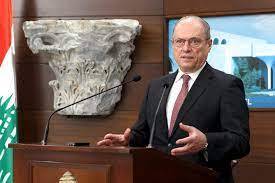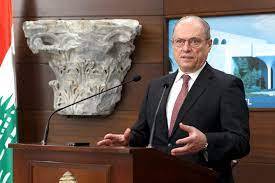Lebanese Deputy Prime Minister Saadeh Al-Shami responded in a special interview with Sky News Arabia to statements attributed to him that sparked a stir regarding the "bankruptcy" of Lebanon. Al-Shami stated that what was attributed to him was taken out of context from a television interview where he was asked about the possibility of both the Lebanese state and the Central Bank of Lebanon contributing to bridging the gap of losses in the country. He revealed that he specifically said, "The state can help with a small amount... I used this expression meaning the state does not have sufficient financial capabilities."
He questioned, "Who am I to declare the state's bankruptcy?" expressing his astonishment at the news headline that caused confusion in Lebanon and the region. Al-Shami argued that "such a headline is ridiculous, and there is no truth to what was conveyed in this news at all."
**Confusion Over Statements**
The news of Lebanon's bankruptcy, which circulated on the lips of Deputy Prime Minister Saadeh Al-Shami, has caused confusion over the past hours. Experts clarified to Sky News Arabia that Al-Shami's remarks do not imply the bankruptcy of the state. In this context, former MP Mustafa Alloush told Sky News Arabia, "There is no doubt that the state is not bankrupt; it has assets and other matters it can use to cover the losses, but the major issue is that the economic situation is 'bankrupt,' and economic prospects are politically and security closed."
He added, "Practically, the Lebanese economy is bankrupt even if the state is not bankrupt, and the Central Bank of Lebanon has a problem with its limited reserve funds." On his part, Riad Salameh, Governor of the Central Bank of Lebanon, stated on Monday that the bank continues to perform its legally mandated role, and the claims of the bank's bankruptcy are untrue. The Central Bank Governor rejected media reports about the Central Bank of Lebanon declaring "bankruptcy." He added, "Despite the losses suffered by the financial sector in Lebanon, which are being addressed in the recovery plan currently being prepared by the Lebanese government in cooperation with the International Monetary Fund, the Central Bank will continue to carry out its mandated role under Article 70 of the Law on Money and Credit."
**Impact of Statements**
Economic expert Jassem Ajaka told Sky News Arabia: "Such statements harm the economic situation, Lebanon's position, and public confidence in both political and monetary authorities; thus, they should immediately head towards an agreement with the IMF to give people complete reassurance." He further added, "The Central Bank is still financing the market with dollars, and this is not a bankruptcy situation, but rather a liquidity crisis, as the Central Bank cannot go bankrupt while it has revenue from taxes and sovereign funds."
**Metaphorical Expression**
Writer and economic analyst Munir Younes stated to Sky News Arabia: "What was announced by Deputy Prime Minister Saadeh Al-Shami is a metaphorical expression and does not have a legal meaning because the Lebanese state has stopped paying external debts since March 2020, during President Hassan Diab’s government." He added, "The legal meaning of the term is that the Lebanese state is in default and has ceased payments on bonds to external creditors; if the creditors are meant, we stopped paying since Diab’s government. What the Deputy Prime Minister said in the context he mentioned is illegal because states do not declare bankruptcy like companies; if a company goes bankrupt, it is liquidated, and its license is revoked, and it ceases to exist in the legal sense."
Younes continued: "Lebanon is not a bankrupt state but is in default, and the difference is significant. When the Deputy Prime Minister says that the Central Bank is also bankrupt, the statement lacks legal meaning, as central banks can always print currency and continue, albeit with difficulty, even if they lose all their existing assets and funds." He concluded by saying, "What the Deputy Prime Minister said is a metaphorical expression lacking legal support, and he meant to convey that there has been a loss of $73 billion in deposits for depositors, and it is not known who will bear this loss."




